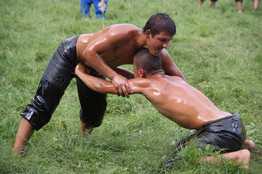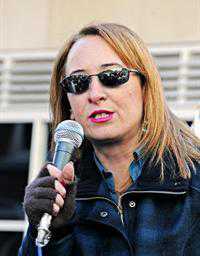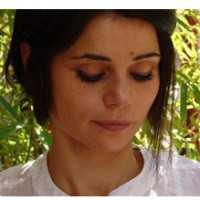 Old Sport’s New Rules Are Too Slick to Some; ‘You Have to Know How to Grab the Kispet’
Old Sport’s New Rules Are Too Slick to Some; ‘You Have to Know How to Grab the Kispet’
EDIRNE, Turkey—Turkish oil wrestling is all about the leather britches.
For three days this weekend, some 1,500 men—from 11-year-old striplings to improbably muscled Goliaths—donned long, thick, black pants made of water-buffalo and cowhide. Then, they doused themselves in olive oil from head to toe and strode into a grassy gladiatorial arena.
It’s the annual Kirkpinar oil-wrestling tournament, which has been staged here for 650 years. To the uninitiated, it seems little more than an open field of oily mayhem. Not so to the appreciative crowd, which roars with excitement at sudden throws or clever holds—”belly sees the sky” being a particular winner—as executed by their oil-wrestling favorites.
“Oh my, I feel like I’ll die of my excitement…the sweat-stained grass smells of oil,” says the Kirkpinar anthem, sung in the procession to open the tournament. In the past, bouts between two men could last for hours and continue the next day.
This year, however, a new fight has come to a head: Traditionalists are furious because a points system has been imposed that is designed to shorten matches. It’s a slippery slope, oil-wrestling traditionalists say.
“It’s in the founding spirit of the Kirkpinar that you [fight] until the end,” says Ahmet Tasci, a legend of the sport who has claimed the Kirkpinar title nine times. His statue stands outside the wrestling grounds. “Can there be anything greater than a history of 650 years?” Mr. Tasci asks. “Can we change the rules? We don’t have the right.”
Seyfettin Selim sees things differently. He prefers an absolute time limit. When Turkey’s president, Abdullah Gul, came to the event, “he got bored because the bouts took so long,” says Mr. Selim, smoking a fat cigar in the grandstand. A spokesman for the president couldn’t be reached Sunday.
Mr. Selim is a big fan of Kirkpinar. But he’s more than that. On Sunday, he paid around $140,000 to buy a ram in a symbolic auction that gave him the title of Aga, or Lord, of the next Kirkpinar. It’s the fourth time he has bought the sheep, giving him the right to co-host the entire event again next year, and also wear the traditional Ottoman Aga costume of brocaded jacket, cummerbund and colorful fez hat.
Kirkpinar isn’t like the wrestling at the Olympics or on the U.S. professional circuit. There’s no mat; there are no ropes. There is, however, a 40-piece Ottoman-style drum band pounding away, all day long, in the arena.
The arena itself is a grassy field about an acre in size dubbed the Field of the Brave. Matches take place simultaneously. Pairs of oil-covered wrestlers square off into the distance.
Referees watch every move. When a match finishes, a new group takes its place. The fighters swing their arms in a ritual swagger, and stoop together in a prayer-like motion. After three days the grass is slick underfoot.
And then there are the britches, known as kispet. Because the oil makes it so tough to grip an opponent, wrestlers try to stick their hands inside each other’s kispet to gain leverage and to grab hold of the cuffs below the knees. To make it harder for opponents to grip their kispet, wrestlers pour oil inside and out.
“You have to know how to grab the kispet,” said Mehmet Yesilyesil, who won the Kirkpinar for the past two years. In 2006 he was also European champion and world bronze medalist in non-oily, Olympic-style wrestling.
Mr. Yesilyesil brings his own olive oil to the Kirkpinar, “extra virgin pressed,” he says. This year it didn’t help him. He was knocked out before the finals.
The core rules are simple—”No punching, hitting, biting or wounding.” If you pin your opponent, or bind him with the “belly sees the sky” move (opponent on back, belly facing upward), you win.
If your opponent manages to successfully perform a move called paca kazik, or “fool’s cuff,” you lose. That’s when your pants get pulled down or torn.
The roots of oil wrestling go deep into ancient Persian, Greek and possibly Egyptian history, according to historical accounts. But the Turks have made the sport their own.
The story goes that in the mid-14th century, an Ottoman commander kept his troops busy during lulls in battle by having them oil wrestle. Legend tells of one particularly gruelling match between two brothers who were so evenly matched that they wrestled for two days, before dying of exhaustion.
As recently as 20 years ago bouts at Kirkpinar still could go on for three or four hours, and if evening fell they would continue the next day. The new points system stipulates that wrestlers wrestle for 30 minutes, and then can win on points in 15 minutes of overtime, or thereafter on a so-called “golden point,” when the first to score, wins. Critics say it makes the wrestlers cautious and lazy, because they know they can win on points if they can make it through the first half-hour.
Bekir Ceker, President of the Turkish Wrestling Federation, promises a rule change for next year that he says will address some of the complaints. But he said points and limits are necessary because there are simply too many contestants. Lack of time limits would mean the tournament could drag on for five or six days, he said.
As this year’s three-day tournament progressed, the fighters, as familiar to the crowd as home-team NFL quarterbacks, began to thin out. When one of the semi-finalists seemed to be trapped on the ground—but then suddenly flipped his opponent in the air so his “belly sees the sky”—the crowd went nuts.
By Saturday, Mr. Yesilyesil was eliminated, which meant he missed the chanced to keep the champion’s 14-carat gold belt by winning three times. His challenger from last year’s two-hour-long championship match, Recep Kara, did manage to slip into this year’s final bout. But in the end, another wrestler, Ali Gurbuz, claimed the title in the 650th annual Kirkpinar oil-wrestling tournament. He won on points.
The Wall Street Journal





